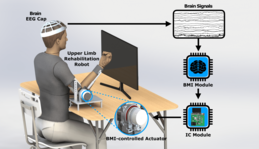Our NSF PFI:RP supported work is progressing nicely! This project is a collaboration between the University of Houston, TIRR Memorial Hermann, National Instruments and Harmonic Bionics.
NSF PFI-RP: Brain-controlled Upper-Limb Robot-Assisted Rehabilitation Device for Stroke Survivors

The broader impact/commercial potential of this PFI project is to advance the national health by accelerating the development, efficacy and use of brain-controlled robotic rehabilitation after stroke by capitalizing on the benefits of non-invasive brain interfaces that extract information about the patients’ motor intent and the real-time assessment of impairment and recovery of motor function.
Stroke is the leading cause of neurological disability in the United States with approximately 795,000 people suffering a stroke each year. Arm paresis is a primary cause of disability because of the limitations it creates in performing activities of daily living (ADL). Approximately 80% of all stroke survivors suffer from upper limb paresis and only 18% of these individuals gain full motor recovery with conventional treatments in the year following stroke. Thus, rehabilitation of the impaired limb is essential for improving ADLs and quality of life after stroke, yet only 31% of stroke survivors receive outpatient rehabilitation.
Brain-controlled robotic devices are excellent candidates for engaging the patients and delivering the repetitive and intensive practice stroke survivors require for rehabilitation. Our innovative robotic rehabilitation solution will offer increased efficiency, lower expenses, and new sensing capabilities to the therapist while reducing the socioeconomic burden of disability.
